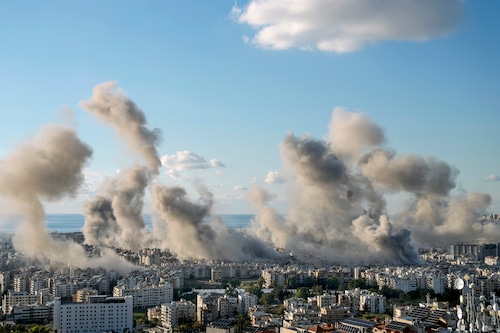On Tuesday, Israel signed a ceasefire deal with Hezbollah in Lebanon mediated by the United States, bringing an end to nearly 14 months of warfare associated with the conflict in the Gaza Strip.
The ceasefire would be a significant first step in putting an end to the regional instability brought on by the October 7, 2023, Hamas onslaught on Israel. However, it ignores the terrible war in Gaza, where Hamas continues to hold scores of captives and the struggle is becoming more unwinnable.
Israel carried out the most severe round of attacks in Beirut and its southern suburbs since the beginning of the conflict and issued a record number of evacuation warnings just hours before the ceasefire with Hezbollah was about to go into effect. Israel indicated it intends to hammer Hezbollah before the ceasefire takes effect at 4 a.m. local time on Wednesday, killing at least 24 people in strikes nationwide, local officials said.
Shortly after the ceasefire was declared, Beirut was rocked by another massive airstrike.
Prime Minister Benjamin Netanyahu asserted that the arrangement included the ability for Israel to strike Hezbollah if it felt the terrorists had broken it, but Hezbollah and Lebanese authorities have refuted this claim, suggesting that there is still some lingering disagreement over the matter.
Netanyahu delivered the ceasefire agreement to the Israeli security cabinet, which then approved it, according to his office. Speaking in Washington, U.S. President Joe Biden hailed the accord as “good news” and promised that his administration would fight for a truce in Gaza once more.
Without specifying how, U.S. President-elect Donald Trump has pledged to bring about peace in the Middle East. Much of this year was devoted to the Biden administration’s efforts to mediate a truce and the release of hostages in Gaza, but the negotiations frequently came to a standstill.
Iran, which supports both Hezbollah and Hamas and exchanged direct fire with Israel twice this year, is expected to be less likely to wage war against Israel if the violence in Lebanon stops.
Israel says it will attack with might if Hezbollah breaks truce
Following a broadcast speech in which he enumerated a number of successes against Israel’s adversaries throughout the region, Netanyahu gave the ceasefire proposal to Cabinet members. According to him, a ceasefire with Hezbollah would further isolate Hamas in Gaza and free Israel to concentrate on Iran, its principal adversary, which supports both organizations.
We will strike if Hezbollah violates the deal and seeks to re-arm, he declared. We will launch a fierce onslaught for each infraction.
As part of the ceasefire agreement, Hezbollah would have to withdraw its armed forces from a large area of southern Lebanon for a two-month period, and Israeli forces would have to go back to their side of the border. An international tribunal led by the United States would oversee compliance from all sides while thousands of more Lebanese troops and U.N. peacekeepers would deploy in the south.
Biden stated that although the agreement was intended to be a permanent halt to hostilities, Israel retained the ability to swiftly begin operations in Lebanon in the event that Hezbollah violated the terms of the truce.
According to Netanyahu’s office, Israel values the U.S. efforts to close the deal but maintains the right to take action against any security danger.
Najib Mikati, the interim prime minister of Lebanon, praised the truce and called it an important step toward stability and the repatriation of displaced persons.
Although Hezbollah has stated that it agrees with the plan, a senior official with the organization stated on Tuesday that it has not yet seen the final version of the deal.
Mahmoud Qamati, deputy chair of Hezbollah’s political council, told the Al Jazeera news network that he would examine the deal signed by the enemy government and determine whether it aligned with the agreement reached by Lebanese officials.
He made reference to Israel’s desire for freedom of action when he remarked, “Of course, we want an end to the aggression, but not at the expense of the sovereignty of the state.” Any infringement on sovereignty is not tolerated.
Warplanes bombard Beirut and its southern suburbs
The terrorists launched rockets, missiles, and drones across the border, and Israel continued to bomb what it claims are Hezbollah locations throughout Lebanon, despite the current momentum behind peace talks.
The second time in recent days that jets have struck the congested region close to the city’s core, an Israeli strike on Tuesday destroyed a residential building in central Beirut. The Health Ministry of Lebanon reports that 37 people were injured and at least seven individuals were murdered. At least one person was killed and thirteen injured in strikes on the southern suburbs of Beirut, according to the report.
Separate strikes in Beirut and a strike on a Palestinian refugee camp in southern Lebanon both claimed three lives. Ten more persons were murdered in the eastern Baalbek province, according to Lebanese official media. Israel claims that it attacks the infrastructure and fighters of Hezbollah.
For the first time, Israel also attacked a building in the busy business sector of Hamra in Beirut, which is around 400 yards from the Central Bank of Lebanon. There were no casualty reports.
The Israeli military claimed to have hit targets connected to Hezbollah’s financial wing in Beirut and other locations.
Numerous locations were under evacuation alerts, including previously unaffected districts of Beirut. Residents fled as a result of the warnings and concerns that Israel was intensifying its attacks before to a ceasefire. There were cars with mattresses tied to them, and traffic was backed up. Israeli drones buzzed loudly overhead as dozens of people, some still in their pajamas, gathered in a central area, standing around fires or huddled under blankets.
Israeli military spokesman Avichay Adraee issued evacuation warnings for 20 buildings in the southern suburbs of Beirut, which are heavily populated by Hezbollah. Additionally, he issued a warning for the southern town of Naqoura, which is home to the headquarters of UNIFIL, the U.N. peacekeeping operation.
Peacekeepers will not leave, UNIFIL spokesperson Andrea Tenenti told The Associated Press.
Israeli forces reach Litani River in southern Lebanon
A few miles from the Israeli border, in the Slouqi area on the eastern end of the Litani River, the Israeli military also reported that its ground forces engaged in combat with Hezbollah fighters and destroyed rocket launchers.
Hezbollah would have to relocate its forces north of the Litani, which is in some areas almost 20 miles north of the border, in accordance with the ceasefire agreement.
On October 8, 2023, a day after Hamas launched their offensive on southern Israel, which led to the Gaza war, Hezbollah started firing into northern Israel, claiming it was demonstrating solidarity for the Palestinians. Since Israel fired back at Hezbollah, the two groups have been exchanging intense rounds of fire.
In order to allow tens of thousands of evacuated Israelis to return to their homes, Israel intensified its bombardment campaign in mid-September and then dispatched troops into Lebanon with the promise of stopping Hezbollah fire.
According to Lebanese health officials, Israeli fire has killed over 3,760 individuals in Lebanon over the last 13 months, many of them civilians. 1.2 million people have fled their homes as a result of the bombardment. Israel claims to have murdered over 2,000 members of Hezbollah.
Hezbollah rockets have reached as far south in Israel as Tel Aviv, and its firing has caused about 50,000 Israelis to evacuate in the country’s north. There have been at least 75 fatalities, with almost half being civilians. The ground offensive in Lebanon has claimed the lives of almost fifty Israeli soldiers.
— The Associated Press, Josef Federman, Kareem Chehayeb, and Bassem Mroue
This material was contributed to by Lujain Jo, Sally Abou AlJoud, and Aamer Madhani.
Note: Every piece of content is rigorously reviewed by our team of experienced writers and editors to ensure its accuracy. Our writers use credible sources and adhere to strict fact-checking protocols to verify all claims and data before publication. If an error is identified, we promptly correct it and strive for transparency in all updates, feel free to reach out to us via email. We appreciate your trust and support!



